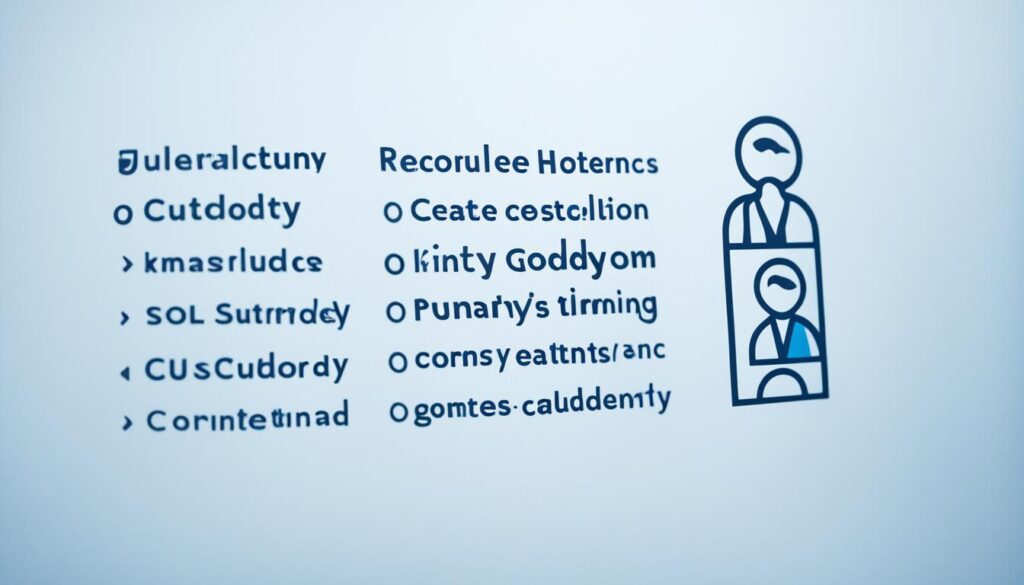Across the U.S., **millions** of unmarried parents lack formal custody agreements. This leads to chaos because of varying state laws. Without court orders, custody issues become legally complex and emotionally tough, deeply impacting families. Parenthood brings certain responsibilities and rights. However, for unmarried parents, custody can get surprisingly tricky without a formal agreement.
In the sphere of custody law, without a custody arrangement sanctioned by the judiciary, the custodial parent is typically determined by marital status at the time of a child’s birth. For married couples, it’s presumed that both have joint legal and physical custody. Conversely, in cases involving unmarried parents, the mother is often bestowed sole custody until the father’s legal paternity is established. This default policy has profound implications, as it permits either parent to take the child across state or even international lines, potentially leading to serious jurisdictional disputes and the urgent need for protective measures.
To advocate for stability and the child’s best interest, we emphasize the importance of a formal custody order. Referencing the Custody X Change app as a facilitator, parents in the midst of custodial disagreements may find solace in the various instruments it provides, such as parenting plan templates, custody calendars, and expense trackers, designed to streamline the intricate process of aligning on custodial arrangements.
Key Takeaways
- Without a court-established custody plan, custodial rights differ based on whether the parents were married at the time of the child’s birth.
- Unmarried mothers generally have sole custody until paternity is legally recognized.
- A formal custody order is crucial to preventing unauthorized removal of the child by the non-custodial parent.
- Legal tools and professional guidance are invaluable for securing a fair and enforceable custody arrangement.
- The Custody X Change app can assist in creating detailed parenting plans and custody schedules.
Understanding Custody Rights and Legal Parenthood
In navigating the complexities of family law, understanding the nuances of custody rights and legal parenthood is essential for parents and guardians. The state’s recognition of an individual’s legal relationship to a child not only defines their responsibilities but also establishes their rights under various circumstances.
Definition of Custody and Legal Parenthood
Child custody can be segmented into two main types: joint physical custody and joint legal custody. Joint physical custody allows a child to live with both parents, while joint legal custody involves both parents in decision-making processes concerning the child’s welfare. Legal parent recognition by the state legitimizes a person’s relationship with a child, influencing not only personal affiliations but also legal standings in custodial matters.
Impact of Marital Status on Custody Rights
Marital status plays a critical role in determining initial child custody rights. Married couples are often presumed to have joint legal and physical custody of their children, promoting an environment where child-rearing responsibilities are shared. Conversely, in cases involving unmarried mothers, the default arrangement often awards sole custody to the mother unless a custody order or other legal recognitions, like a recognized Acknowledgment of Paternity, are established.
Recognizing Legal Parents in Various Situations
The recognition of legal parents extends beyond biological ties, particularly in scenarios involving assisted reproductive technologies or complex family structures, such as those in the LGBTQ community. Legal instruments and court orders can establish child custody rights for non-biological individuals who have a substantial presence in the child’s life, ensuring all parties involved have their rights upheld and responsibilities clearly defined.
It is crucial for parents, guardians, and those involved in childcare to understand how a custody order can stabilize and clarify the legal and practical caregiving landscape. As each family situation varies, tailored legal advice is often necessary to ensure that all custodial arrangements serve the best interests of the child involved.
The Legal Implications of Being an Unmarried Parent
For unmarried parents, navigating the intricacies of custody and legal parentage involves understanding several crucial legal concepts and procedures. Our role in this aspect is to shed light on the path both mothers and potential legal parents can take towards establishing rights and responsibilities.
Maternal Custodial Rights Without a Marriage
Typically, sole legal custody is bestowed upon the mother when a couple is unmarried. This grants the mother complete autonomy over decisions concerning the child’s welfare, education, and health, unless contested in court. This initial custody arrangement underscores the need for biological fathers or other individuals to formally acknowledge their role if they wish to share in the parenting responsibilities.
Establishing Legal Paternity for Unmarried Fathers
For fathers not married to the mother at the time of a child’s birth, securing legal parent status can be a matter of crucial legal steps beginning with the acknowledgment of paternity. This document, once signed, serves as a powerful declaration of paternity but requires both parents’ consent. Should there be any doubts regarding paternity, or if the acknowledgment is contested, DNA testing becomes a necessary route to establish biological ties and responsibly resolve custody disputes.
In scenarios where a biological connection is absent yet a parental role has been significantly established, one can still seek legal recognition. This requires demonstrating enduring involvement in the child’s life and advocating for the child’s best interests in a court of law.

Understanding these legal frameworks empowers all involved to ensure that their actions and choices reflect not only their rights but also a commitment to the welfare of the child involved. As always, it is advisable to consult with legal professionals to navigate these processes effectively, ensuring that every move is aligned with legal statutes and truly benefits the child.
Joint Custody Dynamics for Married Parents
In navigating the landscape of family law, married parents custody often involves complexities that extend beyond the straightforward entitlement to joint legal and physical custody. The presumption is that both parents, when married, automatically hold these rights. However, this is not merely a fallback but a manifestation of automatic parental rights that operate under the premise that both spouses equally share the responsibilities and privileges associated with raising their children.
Automated Recognition of Parental Rights in Marriage
Within the framework of married life, the automatic assignment of parental rights to both spouses caters to a unified approach towards child-rearing. These rights are inherently recognized by the law, eliminating the need for immediate legal action to establish custody once a child is born to married parents. This legal convenience supports a fluid transition into parenthood under the protective umbrella of joint custody.
The Need for a Custody Order Despite Joint Rights
Despite the ease of automatic rights, there are significant reasons why married parents might consider formalizing their custody agreements. The potential for unauthorized child removal, where one parent might relocate with the child without consensual approval, exposes a critical vulnerability in the automatic setup. By establishing a detailed custody order through legal channels, parents can ensure that their parenting duties and rights are unequivocally defined, leaving no room for ambiguity.
| Aspect | Without Custody Order | With Custody Order |
|---|---|---|
| Legal Clarity | Limited, based on automatic rights | Explicit, documented specifics |
| Protection Against Unauthorized Relocation | Minimal | High, legal restrictions in place |
| Parental Responsibilities | Implicitly understood | Carefully delineated and enforceable |
| Decision Making | Equally shared but undefined | Clearly defined parameters |
Seeking a formal custody agreement not only strengthens the structural integrity of joint custody but also fortifies the family’s legal standing, ensuring that all actions taken are in the best interest of the child and in compliance with the law.

LGBTQ Parenting and Custody Considerations
As society progresses, the definition of family has expanded to include LGBTQ individuals and non-traditional families, presenting unique challenges under existing custody laws. Understanding and navigating these legal terrains require specialized knowledge and sensitivity towards LGBTQ parental rights.
Consulting LGBTQ Parental Rights Specialists
Securing legal aid from experts in LGBTQ family law is crucial for addressing the specific needs of non-traditional families. These skilled professionals provide guidance and advocacy, ensuring that the legal system recognizes and respects the bond between LGBTQ parents and their children.
The Legal Challenges for LGBTQ Parents in Custody
LGBTQ individuals often face significant legal hurdles when dealing with custody issues, from establishing parental rights to handling custody disputes. Specialist attorneys play an indispensable role in managing these complexities, fostering a legal environment where all families can thrive regardless of their makeup.

Comprehensive legal frameworks and supportive services are essential for empowering LGBTQ parents to overcome barriers and protect their relationships with their children. By ensuring these families receive competent legal support, we affirm our commitment to equality and justice in every aspect of parenting and family law.
Protective Measures: The Importance of a Custody Order
In our ongoing commitment to offer critical insights during a custody battle, understanding the severe implications of not having a custody order is essential. This understanding avoids scenarios of child endangerment and combats the risk of parental abduction which can have distressing emotional consequences.
Preventing Unauthorized Relocation of a Child
The lack of a custody order opens doors to potential crises where a child may be moved out of the jurisdiction without consent. In these situations, an emergency custody order can act as a powerful deterrent, providing immediate protection and enforcing boundaries critical in safeguarding the child’s welfare.
The Role of Emergency Custody Orders
An emergency custody order serves as a crucial legal mechanism in situations pointing towards imminent risk of harm or parental abduction. It’s only granted when compelling evidence of danger or immediate threat to the child’s safety is established, emphasizing the absolute necessity of having a formal and recognized custody agreement.

Let’s consider the effectiveness of emergency custody orders through a detailed examination:
| Aspect | Description | Impact on Child Safety |
|---|---|---|
| Immediate Legal Action | Allows for swift court intervention to prevent child relocation or endangerment. | High – Provides an instant legal barrier against potential abductions. |
| Legal Requirements | Requires substantial proof of danger or credible threat to the child’s well-being. | Moderate – Ensures that the use of emergency orders is justified and evidence-based. |
| Execution | Executed fast due to the urgency, avoiding bureaucratic delays common in regular proceedings. | High – Reduces the window of risk for child endangerment or unauthorized relocations. |
As we navigate through these legal landscapes, the pivotal role of a custody order cannot be understated. Not only does it fortify legal standing, but it also serves as a preventive framework against scenarios of child endangerment and abduction, providing peace of mind and security for both the child and the parents involved.
Settling Custody: Agreement vs. Court Decision
When parents find themselves at a crossroads in matters of custody, the paths available to reach a resolution often involve either mutual agreements or judicial intervention. The chosen route can significantly affect the family’s future dynamics and the well-being of the child involved.
Negotiating a Parenting Plan
Negotiating a parenting plan is a collaborative effort where both parties work towards a fair custody settlement without stepping into family court. By focusing on the child’s needs, parents can outline living arrangements, education plans, health care decisions, and holidays. If agreed upon, this plan is submitted to the court for approval, cementing it as a formal custody settlement.
The Trial Process for Custodial Decisions
If negotiations falter, custodial disputes may be resolved through a trial in family court. This lengthy process requires presenting evidence to a judge who will decide based on the child’s best interests. Temporary orders might be issued during this period, providing structure until a final decision is reached.
In understanding the gravity of these decisions, it’s crucial for parents to consider all aspects thoroughly, seeking legal counsel if necessary, to ensure that the chosen path aligns closely with the best interests of the child.

Custody X Change: Organizational Tools for Parents
At the heart of effective custody management lies the integration of reliable parenting tools designed to simplify the complexities parents face daily. Among these, the Custody X Change app stands out as a premier solution, providing stellar functionality in co-parenting software that aids in organizing and planning parental responsibilities.
Parenting Plan Templates and Custody Calendars
The Custody X Change app offers a variety of parenting plan templates, ideal for those setting up custody agreements. These templates are tailored to meet different needs and circumstances, ensuring that all essential elements of a custody arrangement are covered thoroughly. Additionally, the custody calendars allow parents to visualize their schedules effectively, facilitating smoother transitions for children and reducing conflicts over shared parenting time.
Tracking Expenses and Time with Your Child
Tracking expenses and time spent with children can be challenging, but with Custody X Change, it becomes manageable. Our co-parenting software provides tools that effortlessly track all child-related expenses and log parenting time. This precise tracking helps ensure fairness and accountability in financial contributions and supports claims during legal proceedings or negotiations.

| Feature | Description |
|---|---|
| Parenting Plan Templates | Customizable plans to suit varying custody arrangements. |
| Custody Calendars | Interactive calendars for scheduling parenting time and events. |
| Expense Tracker | Detailed recording of all child-related expenses for financial management and legal documentation. |
| Time Tracking | Logs actual time spent with the child, useful for reporting in legal scenarios and personal records. |
Special Circumstances: Obtaining Custody as a Non-Parent
In scenarios where family dynamics diverge from traditional norms, gaining custody can involve navigating legal channels that are particularly complex. For non-parents such as relatives or close family friends, family court becomes a pivotal arena where the future of a child’s guardianship is determined. Here, understanding the legal grounds for non-parent custody is critical.
Defining Extraordinary Circumstances
Extraordinary circumstances are specific conditions recognized by the courts that may permit non-parents to claim custody over biological parents. These can include situations of abandonment, persistent neglect, unfitness of the parents, or any other circumstances that jeopardize the best interest of the child. Recognizing these factors is crucial for non-parents considering a custody petition.
Legal Procedures for Non-Parents Seeking Custody
The legal journey for non-parents seeking custody requires thorough documentation and proof that living with the non-parent serves the best interest of the child. This typically involves demonstrating the presence of extraordinary circumstances and articulating a clear plan for the child’s future under their care. Legal specialists in family court proceedings can provide essential guidance in navigating this complex landscape.

Ultimately, our objective in these situations is to ensure that all custodial arrangements serve the well-being and safety of the child, adhering to both legal standards and compassionate understanding. Engaging with family court experts and child welfare professionals is advisable to manage these sensitive cases effectively and justly.
Navigating Visitation Rights in the Absence of a Custody Order
In scenarios where no formal custody order exists, establishing visitation rights and parenting time can become a complex affair. Without clear directives, both parents have equal claims, often leading to custody disputes that only the courts can resolve effectively.
Establishment of Visitation Schedules
Creating a structured visitation schedule is essential for maintaining the child’s routine and emotional well-being. This schedule should aim to balance parenting time between both parents while taking into account their individual circumstances and the child’s needs. Courts typically intervene to establish a consistent routine that honors the best interests standard, ensuring the child has ample time with each parent.
Court’s Role in Upholding the Child’s Best Interests
The court’s primary concern in visitation matters is the child’s welfare. Judicial decisions are guided by the best interests standard which includes assessing the child’s age, the emotional bond with each parent, and each parent’s ability to provide a stable environment. The court’s role is pivotal in instances where visitation rights need enforcement or modification to meet the evolving needs of the child.
| Factor | Parent A | Parent B |
|---|---|---|
| Stability of Home Environment | High | Medium |
| Willingness to Facilitate Visitation | Consistent | Variable |
| Emotional Bonds with Child | Strong | Strong |
| Ability to Provide Daily Needs | Adequate | Excellent |
Understanding these factors can help parents anticipate how courts might view their cases, particularly in the absence of a custody order.

The journey of navigating visitation rights without an existing custody order can be fraught with challenges. However, focusing on the child’s best interests and seeking equitable parenting time ensures that both parents remain active and engaged in their child’s life, despite the difficulties presented by custody disputes.
If There Is No Parenting Plan Who Has Custody
In situations marked by a parenting plan absence, the landscape of custody becomes highly uncertain. This often leads to custody disputes as both parents hold essentially equivalent legal standing over the care and control of their child. Without a written agreement or court order, these circumstances fall under what is termed default custody, where no explicit rights are granted to either parent over the other.
In the delicate balance of unwritten custody arrangements, we find that the necessity for judicial intervention becomes more pronounced. Courts typically step in to mediate and establish a custody agreement that reflects the best interest of the child. However, until such legal determinations are made, both parents are considered to have equal say in the upbringing and welfare of their offspring, often leading to logistical and emotional challenges.

Table below illustrates typical scenarios faced in the absence of a formal parenting plan and possible judicial outcomes:
| Scenario | Possible Judicial Outcome |
|---|---|
| Both parents cannot agree on educational decisions | Court may assign decision-making to one parent based on child’s best interest |
| No agreement on the primary residence of the child | Custody may be split or primary residence awarded to the parent better positioned to provide stability |
| Parents live in different states | Long-distance parenting plan might be established with detailed visitation schedule |
| Conflicting medical decisions | Court could grant sole authority for medical decisions to one parent after evaluating child’s health needs |
In each case, the absence of a predefined parenting plan places the court in a critical role to establish orders that protect the welfare of the child, prioritizing their long-term well-being while considering each parent’s situation and capabilities. Thus, establishing a legal custody framework early helps in mitigating contentious situations that could otherwise disrupt the child’s life significantly.
Modifications and Enforcement of Custody Orders
In the evolving landscape of family dynamics, the need to adapt custody agreements becomes essential. At times, life circumstances change significantly enough to necessitate a custody modification to serve a child’s best interests. Family court often steps in to enforce custody orders when they are disobeyed, safeguarding parental rights and ensuring ongoing stability for the child.
Criteria for Altering Custody Arrangements
Parents may seek a custody modification from the family court if substantial changes in their life or that of their child’s make the current arrangement impractical or detrimental. Such changes might include relocation, a shift in a parent’s job schedule, or new health concerns. Any proposed modification must align with preserving the child’s best interests, ensuring that the adjustment supports their emotional and physical well-being.
Legal Actions When Custody Orders Are Disobeyed
When a custody order is not followed, the consequences can be severe. To enforce custody orders, courts may issue fines, modify the existing order, or, in extreme cases, decree incarceration for contempt of court. This strict adherence underscores the critical nature of compliance to legal agreements dictated by the family court.

| Violation | Potential Court Actions | Parental Rights Implications |
|---|---|---|
| Non-compliance with visitation | Modification of visitation schedule | Limited access until compliance |
| Relocation without consent | Reversal of relocation | Penalties or supervised visitation |
| Withholding child from school or medical appointments | Immediate court intervention | Investigation for potential neglect |
Ultimately, the enforcement of these orders and potential modifications underscores our collective commitment to upholding a framework that honors the parental rights and prioritizes the welfare of children within the judicial system.
Conclusion
As we’ve explored throughout this article, parents who embark on the journey of child custody without a formal plan encounter a myriad of co-parenting challenges. Family law provides a structure within which parents can navigate these difficulties and formulate a responsible approach to raising their children post-separation. The establishment of a legal custody order goes beyond the mere assignment of duties; it’s an essential step in upholding the best interests of the child and safeguarding their future. Custody best practices advise that such an order should clearly delineate parental rights and responsibilities, thus reducing the risk of conflict.
Available tools and resources have proven invaluable for countless families, equipping them with the means to carry out effective co-parenting and child custody resolution. This is imperative in today’s society, where family structures are increasingly diverse and the need for flexibility and understanding in custody arrangements is ever more apparent. Whether parents are part of traditional or non-traditional families, seeking counsel from seasoned legal professionals can make a significant difference in the outcome of custody disputes.
Ultimately, our collective aim should be to establish custody solutions that prioritize the well-being of the children involved. By aligning with family law experts and adhering to the guidelines set forth by state-specific regulations, we position ourselves to create environments where children can thrive amidst changes in family dynamics. In conclusion, through adherence to custody best practices and leveraging expert guidance, we can achieve resolutions that respect the unique needs of each child and family unit.











